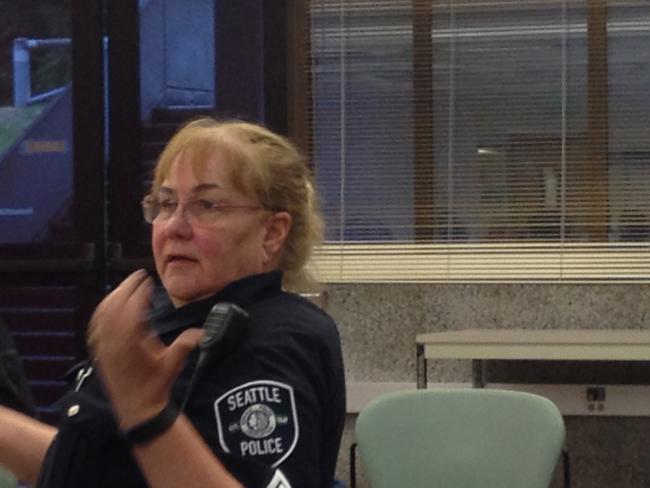At Large In Ballard: The North Precinct Meeting
Community Police Team member Sergeant Dianne Newsom.
Wed, 06/08/2016
By Peggy Sturdivant
On Wednesday June 1st Alison Krupnick attended her first neighborhood advisory group meeting, the North Precinct Advisory Council. She had recently shared her experience in a Seattle Times op-ed piece on being a victim of an assault crime in the parking lot of Ballard’s Neighborhood Center.
For Krupnick the issue of public safety has been increasingly important. She has two teenage daughters on a block that had a drug house and just learned that her assailant is free on bail. As she eloquently wrote to me after the meeting, “My reason for attending the North Precinct Advisory Council meeting came from my growing awareness of how intertwined homelessness, addiction, mental health, and public safety are and my desire to, in some small way, be part of the solution.”
To say that she was disappointed might be an understatement.
I attended as a favor for news reporter Shane Harms.
Unlike neighborhood-based and more general advisory councils the North Precinct Advisory Council’s mission and focus is on public safety issues, in partnership with the Seattle Police Department. On the agenda for the June meeting was an opportunity to hear from all three City Council members from the three districts that are part of SPD’s North Precinct.
To those who are regulars expectations are likely lower than those of Krupnick. Guest speakers often present hard-hitting facts, and new approaches to issues like heroin addiction or pathways to housing. With the councilmembers as guests it was more like two meetings that overlapped slightly, one before the council members left and the one after.
District 5 Councilmember Debora Juarez spoke to planning for the North Precinct’s new police station as enhancing community policing. District 6’s Mike O’Brien spoke to the perceived public safety issues around those without housing. He stated, “We’re not going to criminalize poverty.” Emilio Garza was attending from Rob Johnson’s office and talked about how activating parks may help problem areas.
Attendees had a short time period (and just one minute) to ask questions ranging from whether the City has considered Road to Housing models that “meet people where they are” in terms of addiction or mental illness, why a new police station instead of affordable housing and how can citizens find out what’s working versus not working. A major District 6 question: what’s going to happen to the people living in the RV Safe Lot in the former Yankee Diner site when it closes and emphasis patrols in the North Precinct end?
The two Councilmembers present seemed more resigned than strategic. “I think we’re doing the best we can,” Juarez said referring to a lack of resources commensurate with the need.
“We’re living in a constrained world,” O’Brien said. “If we just tell them (those without housing) where they can’t be, we need to tell them where they can be.” He said he wished the Housing Levy on the ballot in August was for even more funds, “but it’s already doubling the last one.”
Afterwards Krupnick said, “I get the sense Council is putting all or most of its eggs in the housing levy basket, a short-sighted move in my view. It will yield limited viable housing options for the homeless and will fuel levy fatigue. It will not address the public safety problem Ballard currently faces.”
She is cognizant of the distinction between homelessness due to economic downturn on one’s rather than homelessness due to addiction or mental health problems. “Those with mental health and addiction challenges will still not to be able to access or afford low-cost housing. They need different services altogether.”
Sergeant Dianne Newsom gets that. She’s part of the Community Police Team and their stated focus “is on the long-term, and often chronic problems specific to individual neighborhoods.
She was one the community liaisons on the second part of the agenda. Unfortunately the councilmembers were gone when it was SPD’s, Department of Corrections, City Attorney’s office, and King County Prosecutor’s office’s turn to report. Representatives from all those departments had been in the room as part of their jobs, sitting through the first hour and a quarter in order to make their abbreviated reports. “Still fighting the property crime battle,” North Precinct Captain Sean O’Donnell said, also noting, “But the North End has the lowest stats for shots fired.”
DOC Officer Jeff Sargent told about being able to witness and then arrest a pair for stealing mail and packages. “That was kinda cool,” he said. “To see it and then be able to do something about it.”
Sergeant Newsom said her priority remains connecting people with services, especially without word of a plan for when the Yankee Diner RV Safe Lot closes in August at the start of SPU’s project. “I’ve been asking that every day,” Newsom said. “What’s going to happen to my people? Listen to me, ‘my people.’”
Newsom said several people in the RV lot have housing vouchers, but that doesn’t mean a landlord will rent to them. She confessed to being a bit “befuddled” by policies that don’t allow RVs to be parked in private driveways if occuped, even with permission. Brendan Brophy from the City Attorney’s office also mentioned concerns about closure of the Yankee Diner Safe Lot. “We don’t know the plan either,” he said.
Krupnick summed up, “Not having a plan for the August 1 closure of the Yankee Diner RV lot is symptomatic of the city’s lack of planning and coordination around homelessness and especially appalling given the impending closure of the Jungle. I expected leaders to have a list of solutions-oriented plans but they don’t.”
Questions are easy; the answers are hard.


